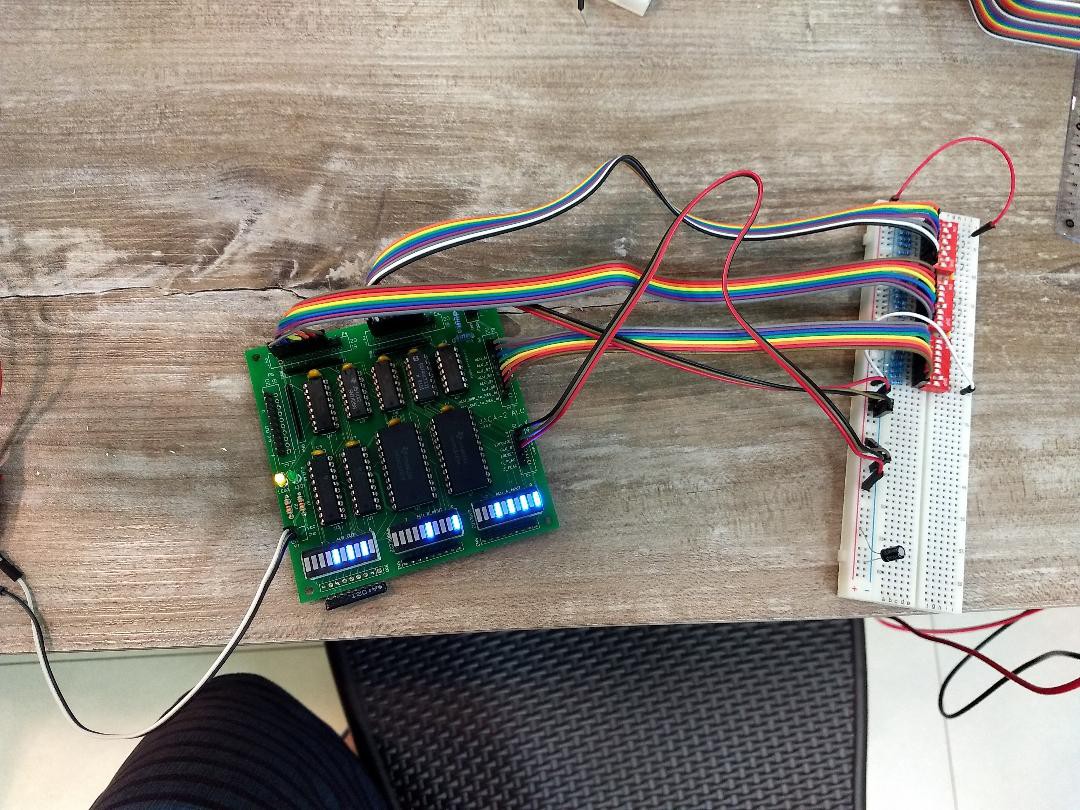After two months stuck in this problem, I finally came to a solution: the fault was on cheap chinese ICs from ebay, which caused a huge drop of tension across the board, making VCC on some IC's to fall below 4 V. So, caution with Ebay components.
ALU working:

Lets stay focused to finish project within the schedule!
Thanks
 Andre Baptista
Andre Baptista
Discussions
Become a Hackaday.io Member
Create an account to leave a comment. Already have an account? Log In.
The faulty IC's work pretty well isolated or on small groups. The issue is: each one of them causes a small drop of tension on the circuit, when you put together 6 or 7 of them, the tension is below the minimum for a TTL IC to work.
Make the test on a breadboard: connect only the VCC and GND pins of the IC and measure the tension, connect another and measure again, and so on. With 7 IC's the tension already droped from 5V to less than 4.7 with the ebay IC's. The same circuit with the new IC's the tension is around 4.9V.
Are you sure? yes | no
The IC's is not really the cause of the voltage dropping, it's rather your wiring of the power bus (both VCC and GND) that is using too thin wires to the pcb and tracks on the pcb.
If the IC's doesn't get hot enough to burn your fingers and the voltage droops at the pcb that is a clear indication that it's badly designed - or that your power supply is insufficient. (Depends if the voltage only goes down at the PCB or also all the way directly at the power supply as well)
Are you sure? yes | no
No, the only difference between the tests were the IC's, same PCB, same power supply, same wires, same multimeter.
Are you sure? yes | no
Yes, but the only cause of this much drop of voltage is that the IC's pulls too much current for the wiring and/or power supply to support it.
And if a your few IC's is pulling enough current to drop the voltage that much (without getting really hot - I.E a *lot* of power) then the wiring/and or power supply is bad/insufficient.
Are you're certain that all new chips are exactly the same family (HC/LS/HCT/AC/F/S) as the old ones? Some families draw a lot less power than others.
Are you sure? yes | no
That's a valid point, some circuits I changed the family, such as the 74LS244 which I changed to 74HCT244, but even the LS should work, right? If I remember well, the current of the entire module was 200mA, the power supply (phone charger) can deliver more than 2 A.
The PCB layout is available here: https://easyeda.com/editor#id=6d906d26d698443c858741ce21c10d6e|8a7b1ed43e724c74bccf9728eee72032|6925a8549672411a8662d4b3f8c78f71|2aef64ed09694e269016cbd6eab5ac25|1fce3159a76f46c9ab0e82f0adebe7c5
As you can see, the power tracks are 0.8 mm wide, more than enought for 200 mA.
Schematic here:
https://easyeda.com/editor#id=1fce3159a76f46c9ab0e82f0adebe7c5|e10ed52966554c5d9040af2ad9bc523e
Are you sure? yes | no
Could you give us a more details about the faulty ICs ? This could help others diagnosing and fixing similar problems :-)
Are you sure? yes | no
Repeating comment (I wrote on wrong place):
The faulty IC's work pretty well isolated or on small groups. The issue is: each one of them causes a small drop of tension on the circuit, when you put together 6 or 7 of them, the tension is below the minimum for a TTL IC to work.
Make the test on a breadboard: connect only the VCC and GND pins of the IC and measure the tension, connect another and measure again, and so on. With 7 IC's the tension already droped from 5V to less than 4.7 with the ebay IC's. The same circuit with the new IC's the tension is around 4.9V.
Are you sure? yes | no
This is curious...
The tension shouldn't drop if the power supply is good and wires are thick.
Another hypothesis is : maybe these chinese ICs are "bad chips" that were binned/sorted at the factory and rejected because they draw too much current. Some unscrupulous worker would recover them in the trash to sell as "good" ?
Did you measure and compare the PCB's current draw, with the two types of ICs ?
Anyway this is a good case to examine the necessity of a proper power supply distribution :-) The check-list is long : thick and short traces, many decoupling capacitors, reduced ripple...
I hope your next boards will be trouble-free !
Are you sure? yes | no